Programs for Children Who Dont Make Friends Easy
How can we help kids make friends? It might seem we can do very little. Making friends is a very personal business, after all.
But building a friendship depends on a child's emotional skills, self-regulation skills, and social competence. And parents can play an important role in the development of these abilities.
For example, many children have trouble making friends because they feel shy or anxious. If we show these kids how to respond to friendly overtures — and provide them with easy, safe opportunities for interacting with friendly people — we can help them build crucial social connections.
Likewise, there are children who struggle because they lack adequate impulse control, or behave in ways that antagonize others. These kids will find it much easier to make friends if we help them develop their self-regulation skills.
And just about every child will benefit from coaching and practice in the social arts. All around the world, successful friendship depends on the same, fundamental skills. To be successful, kids must
- regulate their own, negative emotions;
- understand other people's emotions and perspectives;
- show sympathy, and offer help to friends in need;
- feel secure and trusting of other people;
- know how to handle introductions, and participate in conversation;
- be capable of cooperation, negotiation, and compromise;
- know how to apologize, and make amends; and
- be understanding (and forgiving) of other people's mistakes.
It's a long list, and honing these skills requires experience, effort, practice.
But that's precisely why parents and teachers can be helpful. Making friends isn't a magic trick. It's something we learn. Something we can help our children learn.
So here is an evidence-based guide — 12 concrete ways that we can help kids make friends.
1. Show your child warmth and respect. Don't try to control your child through threats, punishments, or emotional "blackmail."

It might not seem of immediate relevance to your child's ability to make friends. But the way parents treat children has an impact on their emotional development and social behavior. And this, in turn, can affect their peer relationships.
For example, consider opens in a new windowauthoritarian parenting, an approach to care-giving that emphasizes absolute obedience, low levels of warmth, and an attempt to control behavior through threats, punishments, or shaming.
In research conducted throughout the world, authoritarian parenting has been linked with the development of behavior problems (Lansford et al 2018). And kids with behavior problems have more trouble making friends.
It also appears that parental psychological control — the attempt to manipulate children through guilt trips, shaming, or the withdrawal of affection — sets children up for developing poor-quality friendships (e.g., Cook et al 2012).
By contrast, when parents show warmth, and use positive discipline strategies — reasoning with children, and discussing the reasons for rules — kids tend to become more prosocial over time.
They are more likely to treat others with kindness and sympathy (Pastorelli et al 2015).
They tend to be less aggressive, more self-reliant, and better-liked by peers (Brotman et al 2009; Sheehan and Watson 2008; Hastings et al 2007).
So how exactly can we enforce good behavior without resorting to threats and punishments? For help, see my article about opens in a new window"positive parenting." And to learn more about the effects of different parenting styles, see this opens in a new windowParenting Science guide.
2. Be your child's "emotion coach."
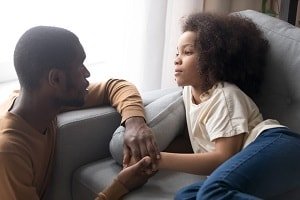
All of us experience negative emotions and selfish impulses. Does it prevent us from maintaining good friendships? No. Not if we know how to keep these responses under control.
So children need to learn how to regulate their own emotions. And parents? We can either help them, or make things more difficult.
For example, in one study, researchers asked parents — the mothers of 5-year-olds — how they responded to their children's negative emotions. Then the researchers tracked child outcomes over the course of several years. What happened?
Kids were more likely to develop strong self-regulation skills if they had grown up with a parent who talked with them — sympathetically and constructively — about how to cope with bad moods and difficult feelings (Blair et al 2013). And the stronger a child's self-regulation skills, the more likely that child was to develop positive peer relationships as her or she got older.
On the flip side, studies suggest that kids develop weaker self-regulation skills when their parents react dismissively ("You're just being silly!") or punitively ("Go to your room!") to their children's negative emotions (Davidov and Grusec 1996; Denham 1997; Denham et al 1997; Denham 1989; Denham and Grout 1993; Eisenberg et al 1996).
So when kids get upset, it's worth taking the time to understand their feelings, and to actively teach them how to handle these feelings in a healthy, constructive way. For tips, see my article, opens in a new window"Emotion coaching."
3. Nurture your child's ability to empathize and "read minds."
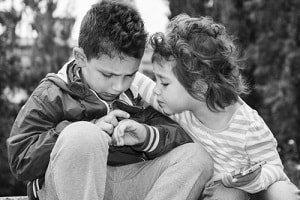
Kids need to do more than control their own, negative emotions. They also need to understand the emotions and perspectives of others.
Aren't these things supposed to come naturally? Maybe, but "naturally" doesn't mean "automatically, without encouragement and support." There are concrete things that parents and teachers can do to help kids develop their emotion-savvy.
For more information see my opens in a new windowevidence-based for nurturing empathy, as well as these activities for opens in a new windowboosting a child's face-reading skills.
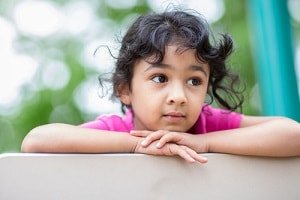
It's hard for kids to make friends if they feel very anxious. But what can we do about it?
Sensitive, responsive parenting is especially important for socially-anxious children. They need to know that we'll be there for them when they need us. And, as I note opens in a new windowelsewhere, studies suggest that sensitive, responsive parenting helps kids develop the kind of secure attachment relationships that promote confidence and independence.
But when kids are really struggling with anxiety, they need additional support.
They perceive the world to be especially threatening, and unless we address that, they're likely to experience ongoing emotional problems — problems that can interfere with the development of social skills (Pearcy et al 2020), and make it very difficult for a child to make friends (Lessard and Juvonen 2018).
So if your child is suffering from high levels of anxiety, talk about your concerns with your pediatrician or school counselor. Child psychologists have developed effective treatments for clinical anxiety, including cognitive behavioral therapy, an approach designed to re-train your child's misperceptions and overreactive emotional responses (Seligman and Ollendick 2011).
But it's also important to keep in mind: Sometimes, the threats are very real.
For example, your child might attend a school where aggressive behavior problems are common. Your child might be aware of peers or neighbors who have suffered violence. Or maybe your child is being exposed to harassment, peer rejection, or bullying.
If that's your child's situation, it makes sense to do what you can to improve your child's environment. This includes taking action to stop violence, harassment, and bullying. But it may also include finding your child a new social outlet — like a club or playgroup — that is especially welcoming and secure.
5. Address your child's aggressive or disruptive behavior problems.
As I mentioned above, such behavior problems can pose a major social barrier to making friends. Kids tend to avoid or shun peers who act out in aggressive ways.
What should you do if your child has trouble with disruptive outbursts or aggressive behavior?
For advice about coping as a parent, see my article, opens in a new window"Taming aggression in children: 5 crucial strategies for effective parenting."
In addition, see my article, opens in a new window"Disruptive behavior problems: 12 evidence-based tips for handling aggression, defiance, and acting out."
6. Teach your child these crucial conversation skills.
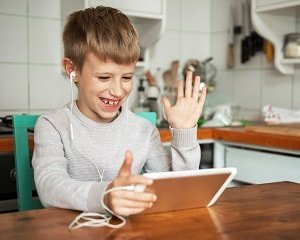
To make new friends, kids need to learn how to introduce themselves to others, and think of appropriate things to say.
They also need to learn how to listen well. And they need to learn how to provide conversational feedback — to show that they understand what another person is expressing.
How do we foster these skills?
We can help by modeling good communication skills at home, and engaging our kids in pleasant, reciprocal conversations (Feldman et al 2013).
In addition, we can help by actively teaching kids what to do and say.
For instance, kids benefit when we teach them the art of "active listening."
That's when a person makes it clear that he or she is paying attention — by making appropriate eye contact, orienting the body in the direction of the speaker, remaining quiet, and making relevant verbal responses (Bierman 1986).
And according to psychologists Fred Frankel and Robert Myatt (2003), we can train kids to become better conversationalists by offering them these concrete tips:
- When starting a conversation with someone new, trade information about your "likes" and "dislikes."
- Don't be an interviewer. Don't merely ask questions. Offer information about yourself.
- Don't be a conversation hog. When engaged in conversation, only answer the question at hand. When you're done, give your partner the chance to talk.
Does your child need more opportunities to practice? Try a phone call, or an online video chat.

Studies suggest that kids get along better when they are engaged in cooperative activities — activities in which kids work toward a common goal (Roseth et al 2008). This is true in the classroom, and it's also true when children play (Gelb and Jacobson 1988).
So if children are struggling socially, it's probably a good idea to steer them away from competitive games, at least until they develop better social skills (Frankel and Myatt 2002).
And Fred Frankel and Robert Myatt offer this additional advice: If your child has a play date, remove toys and games that might spark conflict. For example, they recommend that parents put away toy weapons, as well as any items that could provoke competition or envy. If your child has a prized possession that he or she can't bear to share, it's best to hide it until the play date is over.
Want to learn more about the benefits of cooperative play? See opens in a new windowthis Parenting Science article.
And for a list of specific social activities to try, see my page, opens in a new window"Social skills activities for children and teens."
8. Show your child how to handle awkward social situations.
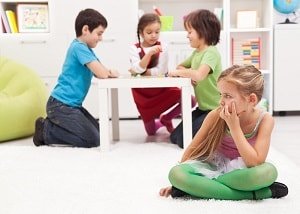
To see what I mean, let's get really specific.
Suppose a child, Sophie, sees several kids playing together. Sophie wants to join them, but she doesn't know how. What should she do?
Victoria Finnie and Alan Russell presented the mothers of preschool children with this hypothetical scenario, asking them to weigh in (Finnie and Russell 1988). And interestingly, the mothers who came up with the best advice were also the mothers whose children demonstrated the best social skills.
What did these sage mothers say?
- Before making your approach, watch what the other kids are doing. What can you do to fit in?
- Try joining the game by doing something relevant. For example, if kids are playing a restaurant game, see if you can become a new customer.
- Don't be disruptive or critical or try to change the game.
- If the other kids don't want you to join in, don't try to force it. Just back off and find something else to do.
It's good advice we can pass along to our own kids. And we shouldn't miss the bigger message from this study: Children benefit when we help them come up with concrete strategies for dealing with awkward social situations.
9. Help kids learn the art of compromise and negotiation.

To build positive relationships with peers, kids need to be able to think of peaceful ways to resolve conflicts. They need to be able to understand what other people need and want; they must be capable of anticipating the consequences of various actions.
Kids who grow up with siblings have a built-in advantage for developing these skills. They get lots of opportunities to practice the art of negotiation.
But you don't have to have siblings to learn good social skills, and all kids — regardless of their family composition — benefit from a little guidance and instruction. Studies suggest that kids can hone their skills through role-playing exercises and activities that ask them to come up with solutions to hypothetical social clashes (Shure and Spivak 1980; Shure and Spivak 1982; Vestal and Jones 2004; Boyle D and Hassett-Walker 2008.).
So it seems a good bet that we can help children become better social problem-solvers by actively walking them through the process. The next time your child butts heads with someone else, consider it learning opportunity. Help your child think of a solution that will be acceptable to both sides.
10. Teach your child how to express remorse and make amends.
It happens to everyone. We mess up. We make a bad judgment. We cause harm or bad feelings.
What happens next? If we are shamed or "cancelled" for our mistakes, we tend to focus on our own negative emotions. We may feel humiliation, resentment, and even anger. And that doesn't help us repair our social relationships. Far from it.
By contrast, consider what happens if we feel a sense of guilt. Feeling guilty can be constructive. We reflect on how our actions have affected others. We empathize with our victims. And it inspires us to try to repair the damage we've caused.
The difference is crucial for making and keeping friends.
Studies confirm that children — even children as young as 4 years — are more likely to forgive a peer for wrongdoing if that peer actively apologizes. And as children get a bit older (and more sophisticated), they pay attention to signs that the perpetrator is remorseful. In fact, they don't always require an explicit apology — not if they observe signs of remorse (Oostenbroek and Vaish 2019).
But what's the most effective way to repair a relationship? Don't just apologize, or act remorseful. Make amends.
In an experiment on 6- and 7-year-olds, researchers observed how children responded to a transgressor who knocked down a tower they'd been building. Kids were forgiving if the transgressor apologized, but they still felt upset. The only thing that made these kids feel better was if the transgressor actively helped them re-build their tower (Drell and Jaswal 2015).
So that's what we should aim for — teaching our kids how to repair relationships and improve bad feelings. From an early age, we should coach them on how to deliver apologies, and how to make amends for their mistakes.
11. Encourage your child to be understanding, and forgiving of other people's mistakes.
Kids can be forgiving, but it doesn't always come naturally. In fact, some children have an ongoing problem with vindictiveness. They tend to assume that other people are hostile, and they may brood about perceived slights and insults.
If that's your child's problem, you'll want to help change his or her perceptions of other people. Help your child consider a transgressor's point of view, and ask your child to think of alternative explanations for problematic behavior.
Maybe it was a careless accident. Maybe the transgressor was stressed-out about something, or feeling tired or ill. Maybe the transgressor was simply having a bad day, and you happened to get in his way.
When adults ask kids to think about such alternative explanations, kids are more likely to give perpetrators the benefit of the doubt (Van Djik et al 2019).
Of course, not every child needs such prodding. Some kids are too indulgent towards wrong-doers. They blame themselves when they get victimized, and remain in relationships that leave them perpetually exploited or mistreated (Luchies et al 2010).
So we need to be mindful of the situation, and give each child the type of support he or she needs.
Studies in a variety of cultures suggest that children are better off when their parents stay informed about their social activities (Parke et al 2002).
Called "parental monitoring," this includes doing things like
- supervising where young children play;
- helping children find opportunities to meet and socialize with friendly, prosocial peers;
- talking to your children's friends when they come to visit, and
- asking your kids to tell you about things they've done in their free time.
There's also evidence in favor of setting certain limits, like insisting that your adolescent tell you in advance about the details of an evening out.
Who will you be hanging out with? What will you be doing? Where will you go?
But parents need to tread carefully. They can embarrass their children — and scare off potential friends — by becoming too intrusive.
And if kids perceive us to be too controlling, they are more likely to reject our guidance. In fact, in one study, adolescents actually became more likely to choose a delinquent peer as a friend if they thought their parents were overplaying their authority (Tilton-Weaver et al 2013).
So it's important to give your child a sense of autonomy, and communicate your concerns in a way that seems reasonable and respectful. Otherwise your child may come to view your authority as illegitimate, and behave accordingly.
For more information, see my article, opens in a new window"Why kids rebel: What children believe about the legitimacy of adult authority."
References: How to help kids make friends
Beirman KL. 1986. Process of change during social skills training with preadolescents and its relation to treatment outcome. Child Dev 57(1): 230-240.
Blair BL, Perry NB, O'Brien M, Calkins SD, Keane SP, and Shanahan L. 2013. The Indirect Effects of Maternal Emotion Socialization on Friendship Quality in Middle Childhood. Dev Psychol. 2013 Jun 24. [Epub ahead of print]
Brotman LM, O'Neal CR, Huang KY, Gouley KK, Rosenfelt A, and Shrout PE. 2009. An experimental test of parenting practices as a mediator of early childhood physical aggression. J Child Psychol Psychiatry. 50(3):235-45.
Chen X and Rubin KH 1994. Family conditions, parental acceptance, and social competence and aggression in Chinese children. Social Development 3: 269-290.
Cook EC and Fletcher AC. 2012. A Process Model of Parenting and Adolescents' Friendship Competence. Soc Dev. 21(3):461-481.
Davidov M and Grusec JE. 2006. Untangling the links of parental responsiveness to distress and warmth to child outcomes. Child Dev. 77(1):44-58.
Dekovic M and Gerris JRM. 1994. Developmental analysis of social cognitive and behavioral differences between popular and rejected children. Journal of applied developmental psychology. 15(3): 367-386.
Denham SA. 1997. "When I have a bad dream, my Mommy holds me": Preschoolers conceptions of emotions, parental socialization, and emotional competence. International Journal of Behavioral Development, 20: 301-319.
Denham, SA, Mitchell-Copeland J, Strandberg K, Auerbach S and Blair K. 1997. Parental contributions to preschoolers' emotional competence: Direct and indirect effects. Motivation and Emotion 21:65–86.
Denham SA 1989. Maternal affect and toddlers social-emotional competence. American Journal of Orthopsychiatry, 59: 368-376. Denham SA and Grout L. 1993. Socialization of emotion: Pathway to preschoolers affect regulation. Journal of Nonverbal Behavior 17: 215-227.
Drell MB and Jaswal VK. 2015. Making Amends: Children's Expectations about and Responses to Apologies. Social Development 25(4): 742-758.
Elicker J, Englund M and Sroufe LA 1992. Predicting peer competence and peer relationships in childhood from early parent-child relationships. In RD Parke and GW Ladd (eds), Family-Peer Relationships: Modes of Linkage. Hillsdale, NJ: Lawrence Erlbaum.
Eisenberg N, Fabes RA, Murphy BC. 1996. Parents' reactions to children's negative emotions: relations to children's social competence and comforting behavior. Child Dev. 67(5):2227-47.
Feldman R, Bamberger E, and Kanat-Maymon Y. 2013. Parent-specific reciprocity from infancy to adolescence shapes children's social competence and dialogical skills. Attach Hum Dev. 2013;15(4):407-23.
Finnie V and Russell A. 1998. Preschool children's social status and their mothers' behavior and knowledge in the supervisory role. Developmental Psychology 24: 789-801.
Frankel FF and Myatt R. 2002. Children's friendship training. Routledge.
Gelb R and Jacobson JL. 1988. Popular and unpopular children's interactions during cooperative and competitive peer group activities. J Abnorm Child Psychol. 16(3):247-61.
Granot D and Mayseless O. 2001. Attachment security and adjustment to school in middle childhood. International Journal of Behavioral Development. 25:530–541.
Hastings PD, McShane KE, Parker R, Ladha F. 2007. Ready to make nice: parental socialization of young sons' and daughters' prosocial behaviors with peers. J Genet Psychol. 168(2):177-200.
Heyman GD, Fu G, and Lee K. 2008. Reasoning about the disclosure of success and failure to friends among children in the United States and China. Dev Psychol 44: 908-918.
Ladd GW and Golter B. 1988. Parents' management of preschoolers' peer relations: Is it related to children's social competence? Developmental Psychology 24: 109-117.
Lansford JE, Godwin J, Bornstein MH, Chang L, Deater-Deckard K, Di Giunta L, Dodge KA, Malone PS, Oburu P, Pastorelli C, Skinner AT, Sorbring E, Steinberg L, Tapanya S, Uribe Tirado LM, Alampay LP, Al-Hassan SM, Bacchini D. 2018. Parenting, culture, and the development of externalizing behaviors from age 7 to 14 in nine countries. Dev Psychopathol. 30(5):1937-1958.
Lessard LM and Juvonen J. 2018. Friendless Adolescents: Do Perceptions of Social Threat Account for Their Internalizing Difficulties and Continued Friendlessness? J Res Adolesc. 28(2):277-283.
Mrug S, Hoza B, and Bukowski WM. 2004. Choosing or being chosen by aggressive-disruptive peers: do they contribute to children's externalizing and internalizing problems? J Abnorm Child Psychol. 32(1):53-65.
Oostenbroek J and Vaish A. 2019. The Emergence of Forgiveness in Young Children. Child Dev. 90(6):1969-1986.
Pastorelli C, Lansford JE, Luengo Kanacri BP, Malone PS, Di Giunta L, Bacchini D, Bombi AS, Zelli A, Miranda MC, Bornstein MH, Tapanya S, Uribe Tirado LM, Alampay LP, Al-Hassan SM, Chang L, Deater-Deckard K, Dodge KA, Oburu P, Skinner AT, Sorbring E. 2016. opens in a new windowPositive parenting and children's prosocial behavior in eight countries. J. Child Psychol Psychiatry. 57(7):824-34.
Pearcey S, Gordon K, Chakrabarti B, Dodd H, Halldorsson B, Creswell C. 2020. Research Review: The relationship between social anxiety and social cognition in children and adolescents: a systematic review and meta-analysis. J Child Psychol Psychiatry. 2020 Aug 11. doi: 10.1111/jcpp.13310. Online ahead of print.
Rose AJ and Asher SR. 2004. Children's strategies and goals in response to help-giving and help-seeking tasks within a friendship. Child Dev 75(3): 749-763.
Seligman LD, Ollendick TH. 2011. Cognitive-behavioral therapy for anxiety disorders in youth. Child Adolesc Psychiatr Clin N Am. 20(2):217-38
Sheehan MJ and Watson MW. 2008. Reciprocal influences between maternal discipline techniques and aggression in children and adolescents. Aggress Behav. 34(3):245-55.
Simons KJ, Paternite CE, and Shore C. 2001. Quality of parent/adolescent attachment and aggression in young adolescents. Journal of Early Adolescence. 21:182–203.
Tilton-Weaver LC, Burk WJ, Kerr M, Stattin H. 2013. Can parental monitoring and peer management reduce the selection or influence of delinquent peers? Testing the question using a dynamic social network approach. Dev Psychol. 49(11):2057-70.
van Dijk A, Thomaes S, Poorthuis AMG, Orobio de Castro B. 2019. Can Self-Persuasion Reduce Hostile Attribution Bias in Young Children? J Abnorm Child Psychol. 47(6):989-1000.
Vestal A and Jones N. 2004. Peace Building and Conflict Resolution in Preschool Children June 2004Journal of Research in Childhood Education 19(2):131-142
Whiting JWM and Whiting BB. 1973. Altruistic and egoistic behavior of children in six cultures. In: RA Levine and RS New (eds) Anthropology and Child Development: A cross-cultural reader. Blackwell.
Xu Y, Farver JA, and Zhang Z. 2009. Temperament, harsh and indulgent parenting, and Chinese children's proactive and reactive aggression. Child Dev. 80(1):244-58.
Content of "How to help kids make friends" last modified 10/ 2020
Image credits for "How to help kids make friends"
image of mother and boy with seagulls by anurakpong /istock
image of father talking with girl on sofa by fizkes /istock
image of little girl looking at injured boy by Tsomka / shutterstock
image of pensive, anxious little girl by Ami Parikh / shutterstock
image of boy in conversation online by StockRocket / istock
image of girls holding hands in circle outdoors by Rawpixel.com / shutterstock
image of little girl feeling left out while other kids talk / ilona75 /istock
image of father reasoning with boy and girl on the grass by imtmphoto /istock
Source: https://parentingscience.com/kids-make-friends/
0 Response to "Programs for Children Who Dont Make Friends Easy"
Post a Comment